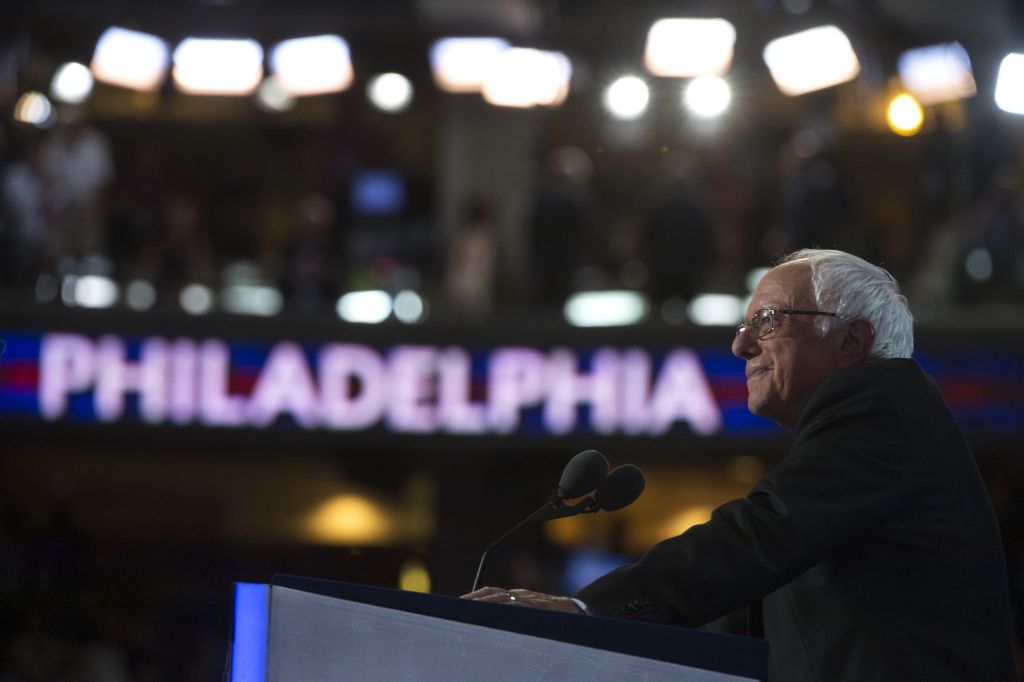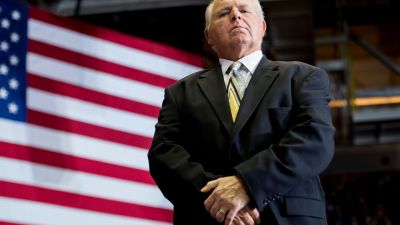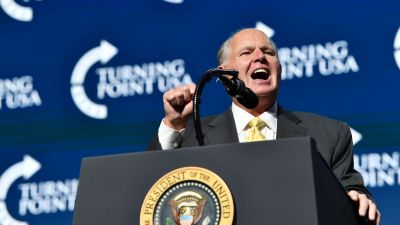
Sen. Bernie Sanders (I-VT) addresses the crowd at the Wells Fargo Center in Philadelphia on the first day of the Democratic National Convention, July 25, 2016. (Photo By Tom Williams/CQ Roll Call)
Apart from anything else he did Monday night at the Democratic National Convention, Bernie Sanders delivered a spot-on indictment of the mainstream political media and its insipid preoccupations. Said Sanders: “This election is not about, and has never been about, Hillary Clinton or Donald Trump, or Bernie Sanders or any of the other candidates who sought the presidency. This election is not about political gossip. It’s not about polls. It’s not about campaign strategy. It’s not about fundraising. It is not about all the things that the media spend so much time discussing.” (The only inaccuracy was that he didn’t say “all” their time.) Sanders then went on to cite the things he thought the election really is about: namely people, policy and history.
Of course, you wouldn’t have known those concerns from the convention coverage. For the TV journalists and pundits, this election was still about the insipid. Amy Walter of The Cook Report, who pops up on PBS for political events toting bouquets of clichés, told us how Hillary Clinton had yet to sound a clear message and that she must do so in Philadelphia. I never heard that one before — OK, maybe 20,000 times, but not in the last week — though the idea that a campaign must be reduced to a sound bite is a media obsession, not a voters’ obsession, and the effect of sloganeering usually comes after the fact. Surveys have shown that Newt Gingrich’s much-vaunted 1994 “Contract with America,” which was said at the time to have turned Congress, really had little or no effect on the outcome — only on pundits’ analysis of the outcome. It wasn’t even released until late in the campaign.
In any case, the story of Monday night, as TV told it, was the Democrats’ unruliness with the DNC email hack and Sanders’ delegates’ vocal mutiny. That is not because the mutiny dominated the night. It didn’t by a long shot. By mid-evening, it was pretty much forgotten — except in the media. There is a reason, and it isn’t a particularly a noble one. By now, it is not news that news is an entertainment medium. The people who manufacture and package it design the news to attract attention and viewers/readers/listeners, just like the movies and other TV shows, which means the media always centralize whatever is most likely to have the lineaments of entertainment. Namely, conflict or scandal.
So, while the hack of the emails and the mutiny may not have been the story of the night, they were certainly the conflict of the night. All evening long, network reporters searched for the most anguished Sanders supporters. On MSNBC, they found a young delegate named Ashley, who complained angrily that Sanders did not have a voice on the podium — this, right after Sanders himself was on the podium. Not to worry. These delegates didn’t have to make sense. They just had to push the narrative. That’s how the media operate.

First lady Michelle Obama speaks on the first day of the Democratic National Convention, July 25, 2016, at the Wells Fargo Center in Philadelphia. (Photo by Robyn Beck/AFP/Getty Images)
By consensus, the highlight of the night was Michelle Obama’s moving speech, framing the election as one about families and progress, with its heart-wrenching line about living in a house built by slaves. When I say “consensus,” I mean that even Fox News analysts gave her kudos. Chuck Todd on MSNBC said they ought to “play it in a loop.” But it got me to wondering whether the media accolades weren’t a form of soft sexism. Michelle is not running for office. She is entirely unthreatening. If you’re a pundit, you can lavish praise on her without seeming to take sides.
Contrast that with Clinton, who is running for office and who is threatening. As I can attest from recently having written a book-length biographical essay on Barbra Streisand for the Yale University Press Jewish Lives series, the media seem to have a problem with smart women, but only when those women don’t seem to know their place, like Streisand and Clinton. Michelle Obama deserved every plaudit she got. The speech was brilliant. But imagine if she were seeking power, and ask yourself if plaudits from the media would still have been forthcoming.
Though it wasn’t easy, I decided to spend most of the night in that alt-universe known as Fox News, or as some, “political bizarro world.” Fox of course has changed our entire media discourse. There was a time when The New York Times set the agenda for just about all news coverage. If it was on the front page of The Times, then the story had to be covered. I even remember some old documentary where a bunch of TV news executives were sitting at their morning rundown meeting going through the paper to find their stories for the evening’s newscast.

The O’Reilly Factor.” width=”736″ height=”395″ /> Bill O’Reilly on The O’Reilly Factor.
Now it’s Fox News that has become a lodestar, despite the fact that, measured as a percentage of the national population, the Fox audience is rather small, nearly all of whom are, and I am not being cruel here, old white men. But when Fox News long ago broke the pretense of neutrality and objectivity, it injected itself into the news agenda and forced those rivals to take notice. Fox pushes Republican talking points right into the mainstream and helps determine not just the news cycle, but elections. Would there have been a Swift Boat campaign without Fox News? Not likely.
There might not even be a Donald Trump without Fox. The O’Reilly Factor barely covered the convention last night. O’Reilly was more interested in emphasizing that Trump’s nightmarish American scenario was accurate — that we are all terrified. And then he had The Three Wise Men of Conservative Punditry — Charles Krauthammer, Newt Gingrich and Brit Hume — bring home the point, though a lot of the banter with Hume had to do with whether O’Reilly himself was being acknowledged at the convention. I had thought the affinity between O’Reilly and Trump was one of two bloviating showmen. It turns out the affinity may be of two pompous narcissists. Meanwhile, as the convention proceeded, O’Reilly ran a long feature on Pokeman Go.
Then Megyn Kelly. There is a rumor afloat that Kelly is a tough-minded journalist and not just another Fox News blowhard. Last night she seemed especially exercised by the DNC emails, which, she said, “overshadowed” Clinton’s “week,” or at least day. The anger, she said happily, is “boiling over,” and now deposed DNC chair Debbie Wasserman Schultz was mentioned more times than Clinton. Kelly, too, found a disaffected Sanders delegate and then upped the ante. She got a former Sanders staffer on her “panel” who decried the Democratic Party for having attacked Republicans when the Democratic Party was really peddling “racism” and had finally been “exposed.” (They must have dug hard to find that one.) There were, of course, the usual charges of “hypocrisy.” Kelly reached back to extoll the first night of the GOP convention. “Nobody remembers the Melania thing,” she said of the plagiarism, and she rhapsodized how Chris Christie’s speech “sticks in your mind.”
Unlike O’Reilly, who wouldn’t allow himself to be upstaged by the convention, Kelly did allow the audience to hear Cory Booker’s speech and then gave Sheriff David Clark, the unhinged Milwaukee cop who wants everyone to carry guns, a platform to critique it. “Fair and balanced” indeed.
Later, Kelly had Hume, Chris Wallace and Juan Williams critique Elizabeth Warren’s speech. Hume, who seems to have been studying psychology as well as punditry, both possibly at Trump University, opined that Warren “isn’t a particularly happy person.”
So is Kelly a hack? To use Fox News’ old slogan: We Report. You Decide.




